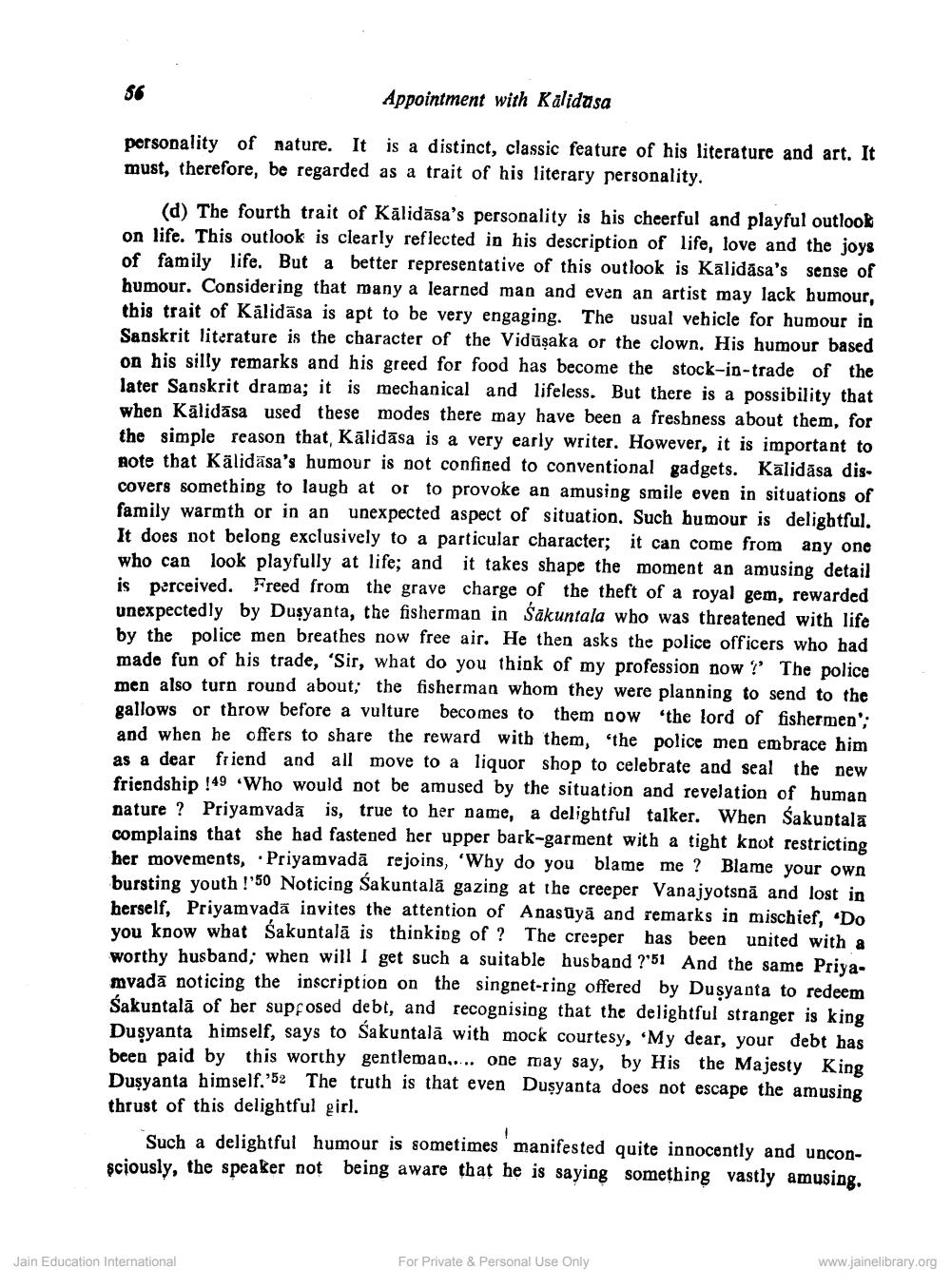________________
S6
Appointment with Kalidasa
personality of nature. It is a distinct, classic feature of his literature and art. It must, therefore, be regarded as a trait of his literary personality.
(d) The fourth trait of Kālidāsa's personality is his cheerful and playful outlook on life. This outlook is clearly reflected in his description of life, love and the joys of family life. But a better representative of this outlook is Kālidāsa's sense of humour. Considering that many a learned man and even an artist may lack humour, this trait of Kālidāsa is apt to be very engaging. The usual vehicle for humour in Sanskrit literature is the character of the Vidūşaka or the clown. His humour based on his silly remarks and his greed for food has become the stock-in-trade of the later Sanskrit drama; it is mechanical and lifeless. But there is a possibility that when Kālidāsa used these modes there may have been a freshness about them, for the simple reason that Kālidāsa is a very early writer. However, it is important to note that Kälidāsa's humour is not confined to conventional gadgets. Kālidāsa discovers something to laugh at or to provoke an amusing smile even in situations of family warmth or in an unexpected aspect of situation. Such humour is delightful. It does not belong exclusively to a particular character; it can come from any one who can look playfully at life; and it takes shape the moment an amusing detail is perceived. Freed from the grave charge of the theft of a royal gem, rewarded unexpectedly by Duşyanta, the fisherman in Sakuntala who was threatened with life by the police men breathes now free air. He then asks the police officers who had made fun of his trade, 'Sir, what do you think of my profession now?' The police men also turn round about; the fisherman whom they were planning to send to the gallows or throw before a vulture becomes to them now the lord of fishermen'; and when he offers to share the reward with them, the police men embrace him as a dear friend and all move to a liquor shop to celebrate and seal the new friendship !49 .Who would not be amused by the situation and revelation of human nature ? Priyamvadā is, true to her name, a delightful talker. When Sakuntala complains that she had fastened her upper bark-garment with a tight knot restricting her movements, Priyamvadā rejoins, 'Why do you blame me ? Blame your own bursting youth !:50 Noticing Sakuntalā gazing at the creeper Vanajyotsnā and lost in herself. Priyamvadā invites the attention of Anasuyā and remarks in mischief, 'Do you know what Śakuntalā is thinking of? The creeper has been united with a worthy husband, when will I get such a suitable husband ?'51 And the same Priyamvadā noticing the inscription on the singnet-ring offered by Dusyanta to redeem Śakuntalā of her supposed debt, and recognising that the delightful stranger is king Dusyanta himself, says to Sakuntala with mock courtesy, “My dear, your debt has been paid by this worthy gentleman..... one may say, by His the Majesty King Duşyanta himself.'52 The truth is that even Duşyanta does not escape the amusing thrust of this delightful girl.
Such a delightful humour is sometimes manifested quite innocently and unconsciously, the speaker not being aware that he is saying something vastly amusing.
Jain Education International
For Private & Personal Use Only
www.jainelibrary.org




